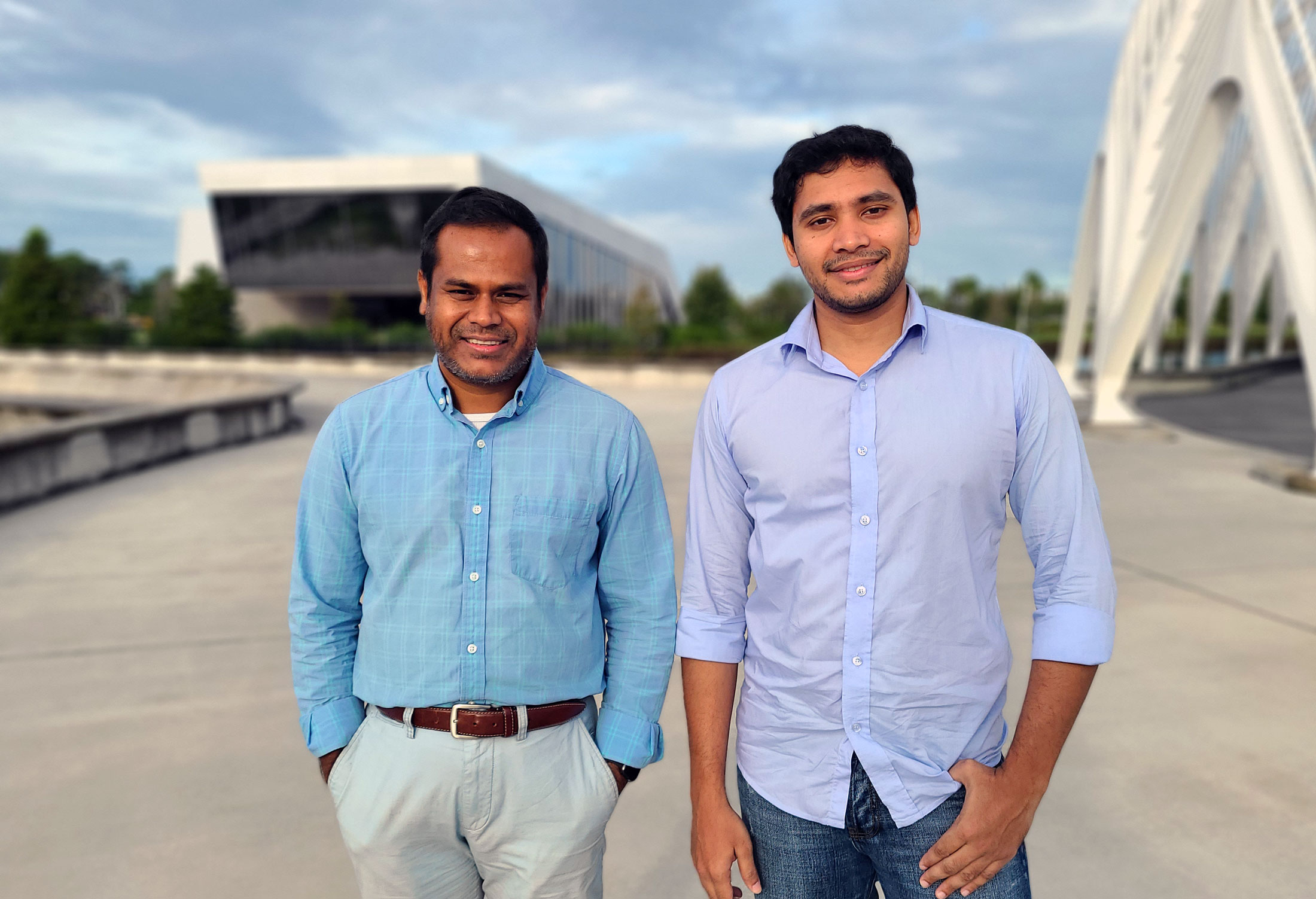
Abu Bony Amin ’20 (right) stands with his Florida Polytechnic University mentor, Dr. Muhammad Ullah. Amin is pursuing his Ph.D. in electrical and computer engineering at the University of Massachusetts Amherst.
Florida Polytechnic University alumnus Abu Bony Amin ’20 is working on research that could improve the assessment of aquatic physical therapy for patients with balance difficulties.
Amin, who received a master’s degree in engineering from Florida Poly in 2020, is pursuing his Ph.D. in electrical and computer engineering at the University of Massachusetts Amherst and research at the institution's College of Nursing.
His doctoral research focuses on creating a system to allow patients to effectively receive physical therapy underwater. Patients who have conditions such as Parkinson’s disease or post-stroke paralysis may experience balance problems and be unable to walk properly. Underwater physical therapy can help improve their balance while they work on movement.
"Currently, there are a lot of devices from Activinsights Limited, UK and other companies that monitor all these applications,” said Amin, an international student from Bangladesh. “We have the accelerometer and gyroscope to track the movement on land, but there are not proper devices for underwater applications to monitor balance, electrocardiogram (ECG) and electromyography (EMG) simultaneously.”
That’s where his work comes in – Amin is developing a system in which patients who are receiving aquatic physical therapy can have their movement monitored through gyroscope and accelerometer sensors, heartbeat monitored through an ECG sensor, and their muscle contraction monitored by an EMG sensor. This device is powered by wireless charging to avoid any potential water penetration.
“While you’re walking underwater, it’s very important to monitor how you’re improving or how your heartbeat is working,” said Amin, who also completed coursework toward a master’s degree in computer science at Florida Poly. “We look at a healthy person’s characteristics and the patient’s characteristics and we differentiate.”
This data undergoes signal processing and machine learning to deliver meaningful outcomes by classifying patients through different feature selections from the data collected from sensors.
Amin said his love for research began at Florida Poly, where he worked closely with Dr. Muhammad Ullah, assistant professor of electrical and computer engineering. The research they did together was foundational to his current success in his doctoral program, Amin said.
“He always guided me, and I am very thankful for the education I received,” he said.
The two worked together on a high-speed VLSI interconnect, structures that connect two or more circuit elements together electrically in integrated circuits. With today’s technology scaling, the interconnect is becoming much more responsible for the delay than the gate doing.
“Abu designed a mathematical model by reconfiguring the various forms of carbon nanotube that can extract the parasitic circuit element to minimize delay at nanoscale domain, which furthers inquiry of my previous research work,” Ullah said. “With the passage of time, he developed math skills, learned MATLAB to extract results, and gained experience with Latex to write scientific articles.”
Amin published two journal articles based on the work, as well as two conference papers, one of which received the best paper award at the Institute of Electrical and Electronics Engineers’ Ubiquitous Computing, Electronics and Mobile Communication Conference (IEEE-UEMCON) in 2019 at Columbia University. He and Ullah are now working together on publishing a book on high-speed VLSI interconnect with a different configuration of carbon nanotube bundle.
“He was not just my supervisor; he is my mentor,” Amin said.
Contact:
Lydia Guzmán
Director of Communications
863-874-8557